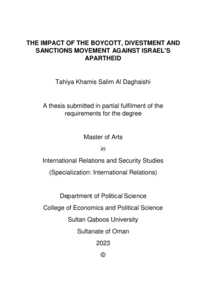Document
The Impact of the boycott, divestment and sanctions movement on Israel's apartheid regime.
Source
Master's thesis
Other titles
أثر حركة المقاطعة وسحب الاستثمار وفرض العقوبات على نظام الفصل العنصري الإسرائيلي
Country
Oman
City
Muscat
Publisher
Sultan Qaboos University
Gregorian
2023
Language
English
Thesis Type
Master's thesis
English abstract
This research examines the relation between two variables, the rise of socio-economic
movements and their potential to influence political behavior of states when the political
solution fails to address the demands of people. The success of non-violent social movements
to end the struggle of Jim Crew segregation and South Africa apartheid political systems
inspired the founders of the Boycott, Divestment and Sanctions (BDS) to change their
resistance strategy to serve their cause. Since its formation in 2005, the BDS movement has
accomplished notable presence that was capable to attract international attention to its
demands. However, the movement's expansion faced robust opposition that escalated to
legislative as well as judicial measures against its advocates and supporters. This research
demonstrates the effectiveness of economic boycotts as a tool of political pressure on policy
makers. From this perspective, the study investigates the strength of people's power represented
in the BDS and compares it with traditional movements against states' systems in association
with New Social Movements Theory. Since its establishment, the movement has been
persistent to rally international support and solidarity. Hence, the study examines the
challenges faced by the BDS and the measures used by the movement to mobilize popular
support and maximize its success. By investigating the indicators that determine the success or
failure of the BDS, this study examines challenges and limitations of the movement. The study
employs qualitative methodology by exploring the literature on its current achievements to
conclude the feasibility of popular movements in the face of inefficient political solutions.
Arabic abstract
يدرس هذا البحث العلاقة بين المتغيرين: صعود الحركات الاجتماعية والاقتصادية وإمكانية تأثيرها على السلوك السياسي للدول عندما يفشل الحل السياسي في تلبية مطالب الشعب. كان لنضال الحركات الاجتماعية والسياسية اللاعنفية ضد أنظمة الفصل العُنصري في جنوب أفريقيا وضد نظام جيم كرو الاثر في إلهام مؤسسي حركة المقاطعة وسحب الاستثمار وفرض العقوبات )BDS )على إسرائيل لتغيير استراتيجية المقاومة لخدمة القضية الفلسطينية. ومنذ تشكيلها في عام ،2005 حققت حركة المقاومة الجديدة حضو ًرا ملحو ًظ جذب الانتباه الدولي إلى مطالبها. ومع ذلك، واجه توسع الحركة ا كان قاد ًرا على ُمعارضة قوية تصاعدت إلى إجراءات تشريعية وقضائية ضد دعاة الحركة وأنصارها. يوضح هذا البحث فعالية حركة المقاطعة كأداة للضغط السياسي على صنّاع القرار والسياسات. ومن هذا المنظور، تبحث الدراسة في القوة الشعبية المتمثلة في حركة المقاطعة )BDS )وتقارنها بالحركات التقليدية ضد أنظمة الدول في سياق نظرية الحركات الاجتماعية الجديدة. ومنذ نشأتها، دأبت الحركة على الكثير من الانشطة لحشد الدعم والتضامن العالمي، ولذا، تبحث الدراسة في التحديات التي تواجهها المقاطعة والتدابير التي استخدمتها الحركة لحشد الدعم الشعبي ومضاعفة نجاحها. من خالل التحقيق في المؤشرات التي تحدد نجاح أو فشل حركة المقاطعة، تبحث الدراسة في تحديات وقيود الحركة، حيث تستخدم منهج البحث النوعي من خالل استكشاف الادبيات حول إنجازات الحركةبالاضافة إلى البيانات السياسية التي تُشير إلى تأثر سياسات الفصل العنصري لاستنتاج جدوى الحركات الشعبية في مواجهة الحلول السياسية غير الفعّالة.
Category
Theses and Dissertations

